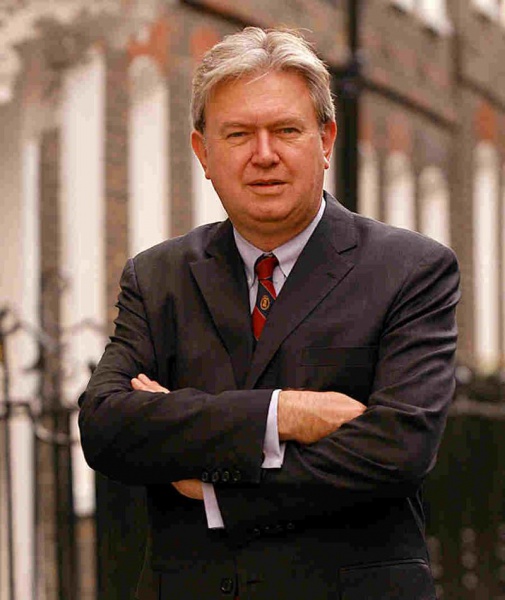John Blundell was born in Congleton in Cheshire on 9 October 1952. He attended King’s School Macclesfield and went on to study economics at the LSE. He was part of the generation of young libertarian and free-market oriented Conservatives who came on the scene at that time, including many who went on to careers in politics and public policy. In 1977 he was hired to head up the Parliamentary and Press Liaison office at the Federation of Small Businesses and made the organisation much more prominent and effective than it had been before. The following year he was elected as a councillor in the London Borough of Lambeth, at that time controlled by a hard-left faction within the local Labour Party led by Ted Knight.
In 1982 he moved to the United States and soon became an active figure in classical liberal (as opposed to conservative) organisations over there. In particular he came into contact with the Institute for Humane Studies (IHS), an educational organisation founded in the early 1960s by F. A. ‘Baldy’ Harper. He also became involved with the Atlas Economic Research Foundation, which Antony Fisher, the founder of the IEA, had set up in 1981 to act as a support for other think tanks and as an agency to create and support free-market think tanks around the world. This was the point where John’s particular combination of skills and qualities became apparent and it became clear that he had found his métier. In 1987 he became President of Atlas and the following year he became president of the IHS. At both institutions he presided over a period of dynamic growth and innovation; this was most noticeable at IHS where there was an expansion of existing programmes and the introduction of new ones.
In 1991 John moved from Atlas and IHS to become President of the Charles Koch and Claude R. Lambe Charitable Foundation, where he played a very important part in the development of a systematic programme of targeted and goal driven philanthropy, not least in the direction of support and development to high-quality young scholars. Over the years these grants have supported a whole generation of people who have gone on to successful and productive careers in academia, the media and public policy and this is undoubtedly one of his most important legacies.
In 1992 he returned to the UK as the Director General of the IEA, taking up post in January 1993. When he arrived, the IEA was a troubled ship with disagreement about its direction and identity and there were serious concerns for its future. John steadied the ship and reaffirmed the historic core purpose and mission of the IEA: that is to affect the climate of opinion in the long term by producing high quality research and publications that influenced the creators of public opinion (academics, journalists, and writers). He had always been a strong advocate of this and had, long before becoming Director General, been highly critical of arguments that the IEA should become more involved in actual policy formation and day-to-day politics. He wrote a number of pieces on how to effectively wage a ‘war of ideas’, which were collected and published by the IEA under the title Waging the War of Ideas in 2003. In 2009 he stepped down as Director General and returned to the US where he continued to be active as a speaker and author, most notably in his Ladies For Liberty: Women Who Made a Difference in American History.
John had a particular combination of qualities that made him an effective and important figure in the history of the freedom movement on both sides of the Atlantic. An excellent public speaker and lecturer, he was also a clear writer, producing a full length life of Margaret Thatcher and the aforementioned book on libertarian women and their contribution to the cause of liberty. He was a highly effective networker and brought together many people who would otherwise never have known each other. He was also a very effective fundraiser but he combined this with a very clear vision of how to use funds and donations to obtain a long-term impact. In contrast to too many people who think of fundraising and other activism simply as a way to support a current short-term campaign, John was a great institution builder who was always looking to convert current donations into something long term that would have a lasting impact. This could involve institutions, programmes and also talented individuals: there are many people all over the world now who owe much to his support and his identification of them as a cause worth investing in. John’s success in the area of institution and programme building can be seen in the number of institutions that he helped to develop or played a part in founding, including the Charles Koch Charitable Foundation, the Buckeye Institute, the Atlas Economic Research Foundation, the Fraser Institute, the Institute of Economic Studies, the Institute for Justice, and (through the Institute Development and Relations Committee of Atlas) many think tanks in various parts of the world.
John will also be remembered by those who knew him for his sense of humour, including truly terrible jokes that he liked to tell, and his penchant for practical jokes. This made it all the more entertaining when the tables were turned and he became the butt of one himself, as happened on one famous occasion while he was at IHS. He was not one for suffering fools gladly but was a warm friend and supporter. He was, throughout the years, part of an effective double team with his wife Christine, who worked with him at IHS and the IEA. He is survived by Christine and their two sons, James and Miles.


